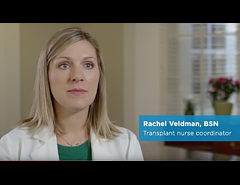The picture below shows the basic steps for both an autologous transplant (using your own cells) and an allogeneic transplant (using cells from a donor).
Before transplant

“Sometimes people think that you get the transplant and then the process is finished, but really getting the transplant, the actual infusion of the cells, is really just the beginning of the healing process.”
– Rachel Veldman, BSN
Transplant Nurse Coordinator
Many things happen in the days and weeks before transplant. You will:
- Have a checkup to make sure your body is healthy enough for transplant.
- Get a central line if you don’t already have one.
- Receive chemotherapy (chemo), and possibly radiation, to prepare your body for transplant. This is also called the preparative or conditioning regimen.
The cells for your transplant are collected before transplant day.
- Autologous transplant – You get your own cells. The cells are collected from your bloodstream or your bone marrow.
- Allogeneic transplant – You get cells from a family member or unrelated donor. The cells are collected from the person’s bloodstream or bone marrow. They can also be from an umbilical cord blood collected from the umbilical cord after a baby is born.
Transplant day (Day 0)
The day you receive your new cells is often called “Day Zero.” It usually comes 1 or 2 days after you finish the preparative regimen.
The transplant isn’t surgery. Instead, the healthy cells are given to you through your central line that was placed into a large vein in your chest or neck. The cells come in blood bags, similar to the ones used for blood transfusions.
After transplant
CALL: 1 (888) 999-6743
Monday through Friday, 8:00 a.m. – 5:00 p.m. Central Time
EMAIL: patientinfo@nmdp.org
CONTACTE AL CENTRO DE APOYO AL PACIENTE
Llame al: 1 (888) 999-6743
De lunes a viernes, de 8:00 a.m. – 5:00 p.m. Horario central
CORREO ELECTRÓNICO: pacienteinfo@nmdp.org
After you get the cells, they move through your bloodstream to settle into your bone marrow. In your bone marrow, they begin to grow and make new red blood cells, white blood cells and platelets. This is called engraftment. It can take days or weeks for engraftment to happen.
Engraftment is an important medical milestone after your transplant. It tells your doctors that the cells are working properly. With these cells, your immune system is now beginning to recover, and you are better able to fight infections on your own. This also marks the beginning of your recovery.
The entire transplant process, from the start of chemo and sometimes radiation, until hospital discharge, can last weeks to months. This is followed by many months of recovery near the transplant center and at home. The transplant team will closely care for you to prevent and treat any complications.
Be The Match® can help you learn more about the transplant process. Contact the Be The Match® Patient Support Center at 1 (888) 999-6743 or patientinfo@nmdp.org.
